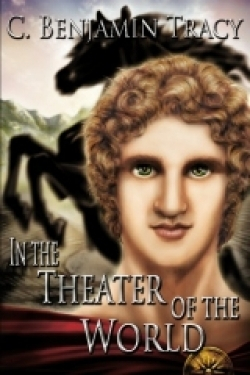In The Theater of the World
Although it could easily and accurately have been titled “Alexander the Great: A Boy’s Life,” C. Benjamin Tracy’s historical novel of the young Macedonian in the years before he went off to conquer most of the known world is more than just another typical work of hero-worshipping biographical fiction. In drawing on his many years of teaching Latin to adolescent students, Tracy has managed to capture the innocence, the excitability, the playfulness, and the overwhelming sense of indestructibility of the youthful Alexander and his playmates.
That Tracy the teacher is also Tracy the student is evident on almost every page. The author knows his subject well. He has drawn heavily from the classic accounts of antiquity to explain and enliven the story of Alexander’s boyhood, from his tutoring by Aristotle to his falling out with, exile by, and eventual reconciliation with his father, Phillip. There is little new material here, but that is not the point of the book. Whether retelling the legend of how the boy prince tamed the wild stallion Bucephalus or describing Alexander’s exuberant battle-winning cavalry charge on the field of Chaeronea, the author manages to give the familiar a bit of freshness.
Told from Alexander’s perspective as if he were writing his memoirs, In the Theater of the World is seasoned with personal observations about the people who taught, teased, and tested him during his adolescence. The book focuses on Alexander’s younger years, before he crossed into Asia to take on the mighty Persian Empire. A pampered prince surrounded by fawning fellows and comely courtesans, Alexander wants for nothing and gets everything he wants whenever he wants it. He expects no less, and makes no apologies for that. Even his introductions to sex and battle are experiences of fun and wonder, and he takes to both with the eagerness and temerity that only a young prince with Alexander’s inherent vanity and sense of invulnerability could.
There is drama in the book, for Alexander’s youth was not all privilege and play. A pawn in a battle for royal power between factions dominated by his mother and his father, Alexander was played by and played against both sides, even to the point of plotting with a foreign king to march upon his homeland and overthrow his father. Tracy handles that contentious episode well, as he does the final act in his drama—Alexander’s reaction to watching the assassination of Philip and his own subsequent grasping of the crown.
In the Theater of the World does not add much, if anything, new to the history or to the legend of Alexander, but in focusing on his adolescence, C. Benjamin Tracy provides a teacher’s insight into what helped make that young man of Macedon earn the title “the Great.”
Reviewed by
Mark G. McLaughlin
Disclosure: This article is not an endorsement, but a review. The publisher of this book provided free copies of the book and paid a small fee to have their book reviewed by a professional reviewer. Foreword Reviews and Clarion Reviews make no guarantee that the publisher will receive a positive review. Foreword Magazine, Inc. is disclosing this in accordance with the Federal Trade Commission’s 16 CFR, Part 255.

